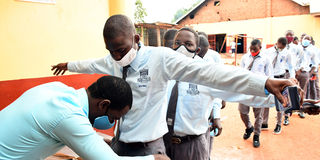How Covid-19 forced out over 6,000 UACE candidates

An invigilator checks students at Lakeside College Luzira in Kampala before they sit for their first paper of Uganda Advanced Certificate of Education (UACE) on April 12. PHOTO/DAVID LUBOWA.
What you need to know:
Prof Mary Okwakol, the Uneb chairperson, said a study conducted by the national exams body attributed the drop to Covid-19 related effects such as failure of private schools to reopen, which left students stranded without alternative UACE exams centres, among other hurdles
The number of candidates who registered for 2020 Uganda Advanced Certificate of Education (UACE) exams has dropped by 6,084 candidates compared to 2019 following the effects of Covid-19 pandemic.
In 2020, a total of 98,392 candidates registered for the UACE exams, whereas in the previous year, 104,476 candidates registered for the exams. This represents a decrease of 5.8 per cent, according to data released in Kampala by Uganda National Examination Board (Uneb) yesterday.
Prof Mary Okwakol, the Uneb chairperson, said a study conducted by the national exams body attributed the drop to Covid-19 related effects such as failure of private schools to reopen, which left students stranded without alternative UACE exams centres, among other hurdles.
“The pandemic affected the livelihood of many parents, who then failed to get school fees for their children, students taking on menial jobs during the period of school closure, and then losing interest in studying,” Prof Okwakol said yesterday.
Uneb also cited cases of pregnancies and early marriages of the female students, forcing the drop in the number of candidates who registered and appeared for the exams.
Prof Okwakol said the findings are similar to the ones in the Uneb National Assessment Progress in Education report on the effects of Covid-19 on the teaching and learning at primary and secondary education levels in the country.
Although 98,392 candidates registered for the 2020 UACE exams, data from the examination body show that only 952 candidates did not turn up to write their exams.
“A significant number of candidates, nearly six per cent, who registered for the examination, didn’t report to sit the examination. Uneb will collaborate with the Ministry of Education and Sports to establish the causes of this absenteeism at all the levels,” Prof Okwakol said.
But Uneb said the number of registered candidates who missed sitting for the UACE has consistently reduced over the last five years.
“The rate of absenteeism of candidates at UACE in 2020 has remained about the same at one per cent in 2019, and has been reducing over the last five years,” Uneb Executive Director Dan Odongo said during the release of the 2020 examinations at State House Nakasero, Kampala, yesterday.
The Director of Education Standards, Dr Kedrace Turyagyenda, acknowledged that Covid-19 disrupted the preparation of UCAE exams.
She said some schools weren’t prepared enough, while some teachers had ditched teaching for other jobs such as riding boda bodas yet their hand in preparing students for examination was crucial.
“Some parents lacked money to pay for their children’s exams registration fees due to the hard economic times and this partly explains why the number of candidates who sat the examination dropped,’’ she said.
She added that the ministry and the examinations body will study the matter and see how a similar scenario can be avoided in the future.
During the release of the Uganda Certificate of Education (UCE) exams last month, the Minister of Education of and Sports, Ms Janet Museveni, tasked the technical team at the ministry to explain the high number of absentees during the 2020 UCE exams.
The minister had partly attributed the absenteeism to the disruption by the Covid-19 pandemic that caused a near two-year closure of learning institutions.
Ms Museveni yesterday said the dropout can be addressed through harmonised efforts by government and parents.
The minister, as was the case for the UCE exams, appealed to parents to play their part in ensuring their children finish school, instead of blaming the government.
She decried the drop out of female students. “What worries me is when I hear and read about girls dropping out [of school] and being married off. To me, this is a real issue that we should boldly confront as a society... I must commend those parents whose daughters became pregnant but they committed to return them to school, after they delivered the children,” Ms Museveni said.
“That determination gives me the hope that those learners who did not return to school at this level for various reasons will still return to school to continue with their education. Our education does offer a second chance,” she added.
Withheld results
Mr Odongo reported that cases of malpractice have remained low at A-Level compared to the lower levels, adding that those whose results were withheld, a number that was not disclosed, would be subjected to a hearing.
“… Cases of malpractice at this level have remained low. The reported ones have been mainly external assistance in Mathematics, Biology and Computer studies,” he said.
Ms Museveni attributed the fall in malpractice to strict measures instituted.
By Nobert Atukunda, Elizabeth Kamurungi & Amos Ngwomoya




